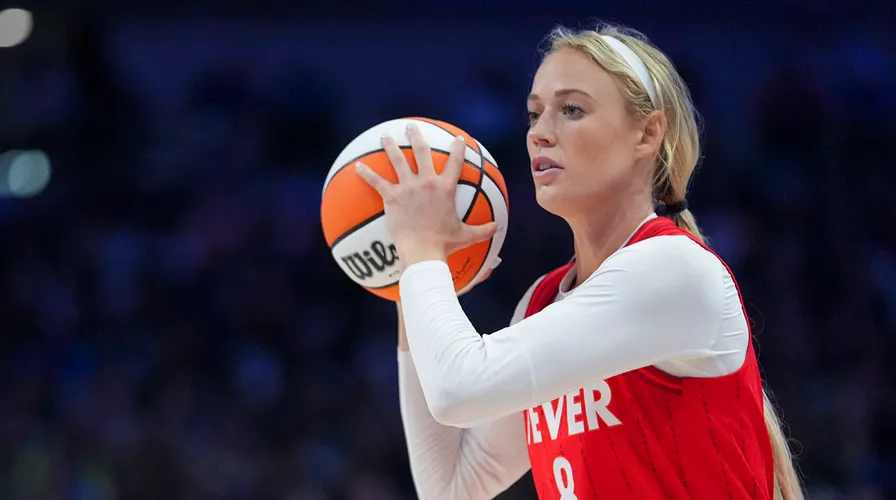The WNBA has been growing steadily in popularity, drawing unprecedented crowds, breaking viewership records, and expanding its national footprint. Yet, with growth comes growing pains—and controversy. The latest firestorm erupted after Los Angeles Sparks’ official social media account seemingly took a pointed swipe at Indiana Fever forward Sophie Cunningham following her recent comments about WNBA expansion. The drama didn’t take long to ignite heated discussions across fanbases, social media platforms, and sports talk shows, as Cunningham’s words were met with fierce criticism, and the Sparks’ reaction fanned the flames.
Cunningham, known for her gritty play and outspoken personality, made waves during a recent interview when she appeared to cast doubt on the WNBA’s recent expansion efforts. “The league’s not ready,” she said bluntly. “We can barely support the teams we have now. Adding more just dilutes the product.” While she attempted to clarify her comments as concern for league sustainability, many fans and fellow players saw her take as a dismissive and regressive stance at a time when the league is experiencing historic highs.
For a league that’s seen a surge in popularity thanks to young stars like Caitlin Clark, Angel Reese, Cameron Brink, and long-standing veterans like A’ja Wilson and Breanna Stewart, Cunningham’s comment came across to many as a tone-deaf dismissal of progress. That perception only deepened when Sparks’ official X (formerly Twitter) account entered the chat with a cryptic post.
Without mentioning Cunningham by name, the Sparks posted a short but pointed message: “Some people fear growth because it threatens their comfort zone. That’s not leadership. That’s insecurity. We welcome expansion. Let’s grow the game.” The timing and tone left little ambiguity. It was widely interpreted as a response to Cunningham’s remarks.
Social media users quickly pieced it together. The replies and quote tweets lit up, with fans tagging Cunningham and debating whether the Sparks had crossed a line or simply stood up for league progress. Some applauded the Sparks for taking a stand. Others felt it was unnecessarily confrontational.
But this wasn’t just a social media spat—it was a snapshot of a larger philosophical divide within the league. As the WNBA prepares to add new franchises, including the much-anticipated Golden State Valkyries in 2025, opinions vary among players and stakeholders about what this means for competitiveness, salaries, playing time, and market share.
Cunningham, a player who has carved her niche through toughness and candidness, likely saw her comments as realism. Her point—that the league must ensure financial and operational sustainability before expanding—has been echoed in past years. But her delivery lacked nuance, and in the current climate of momentum and optimism, it rubbed many the wrong way.
The Sparks, a legacy franchise with multiple championships and a fan base that has supported women’s basketball for decades, have positioned themselves as champions of growth and progress. Their subtle jab at Cunningham wasn’t just a clapback—it was a declaration. Expansion isn’t a threat, they argued—it’s a necessity.
From a competitive standpoint, adding teams to the league opens more roster spots and creates opportunities for talented players who are currently forced overseas or cut too early. This season alone, several highly-touted draft picks didn’t make rosters due to the limited number of teams. Critics of the current structure argue that a league trying to market itself as elite cannot afford to discard elite talent due to limited space.
This is where the tension lies. For veteran players fighting for minutes and contracts, expansion introduces both risk and reward. It dilutes team chemistry temporarily but strengthens the league’s long-term appeal. Younger players and fans, energized by the explosion of interest around rookie stars, overwhelmingly support expansion. In this context, the Sparks’ post can be seen as aligning with the future.
The irony is that both sides of the debate are rooted in concern for the league. Cunningham’s comment, though clumsily framed, likely came from a place of wanting to protect the integrity and viability of the WNBA. The Sparks’ response, though sharp, was meant to rally support for continued growth and inclusion.
Yet, in a league that is still battling for equal visibility, sponsorship dollars, and media respect, unity is a precious commodity. Public spats—even indirect ones—can distract from the broader goals of the WNBA. Some analysts argued that while the Sparks’ post was empowering, it may have escalated what could have been a private or more nuanced dialogue.
Others, however, believe that such debates are healthy. They bring attention to issues the league must confront as it scales: How to maintain quality of play while growing the league. How to ensure every franchise is supported without spreading resources too thin. How to bring in more fans, not just in big cities but nationwide.
Social media, for better or worse, has become the battleground for these conversations. When an official team account speaks, it carries the weight of an entire franchise. That’s why the Sparks’ post was so impactful. It wasn’t a player making a side comment—it was a franchise staking a position. And in doing so, they forced a conversation the league may need to have more openly.
Meanwhile, Cunningham has not issued any follow-up statement, and neither have the Sparks clarified their post. Whether this escalates further or fizzles out remains to be seen. But fans are watching closely. The Fever have already been in the spotlight all season thanks to Caitlin Clark, and any added drama only fuels the interest.
The truth is, the WNBA is in transition—between eras, between identities. The league is expanding not just in size but in cultural impact. From jersey sales to record viewership, from packed arenas to multi-million-dollar endorsement deals, the sport is shifting. And with that shift comes growing pains, differing opinions, and moments of public tension like this one.
But if there’s one silver lining, it’s that the WNBA is being talked about—loudly, passionately, and frequently. That was not always the case. A decade ago, a comment like Cunningham’s might’ve gone unnoticed. A social media post from a franchise might not have stirred national discussion. Today, every move matters. Every voice echoes.
The Sparks, with their post, chose to be more than a team—they chose to be advocates. Whether fans agree with their method or not, their message was clear: The future of women’s basketball is expansion, opportunity, and boldness. Standing still is not an option.
As for Sophie Cunningham, she remains a polarizing figure—tough, vocal, and unapologetic. Whether she doubles down or offers further context will shape how this story unfolds. But regardless, the incident underscores that the WNBA is no longer just a league. It’s a movement, and movements are always messy before they become moments of transformation.
The expansion debate is far from over, and more voices will weigh in. But one thing is certain: the WNBA is on a path forward, and no one—not even its own players—will be able to hold back the momentum. Whether through disagreement or unity, the conversation around the league is growing. And that’s exactly what expansion looks like.


